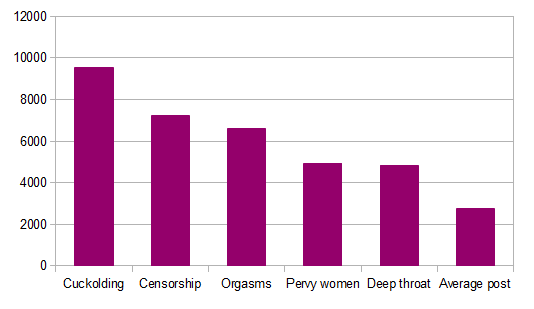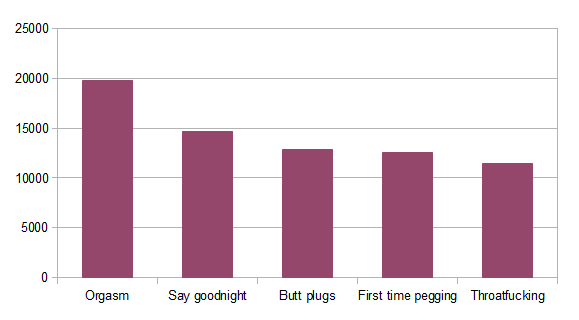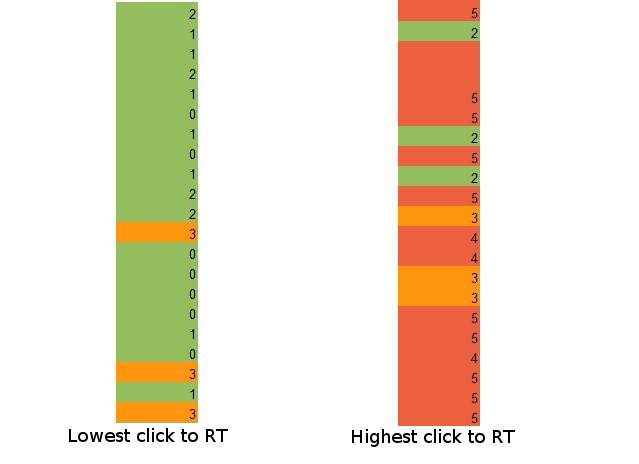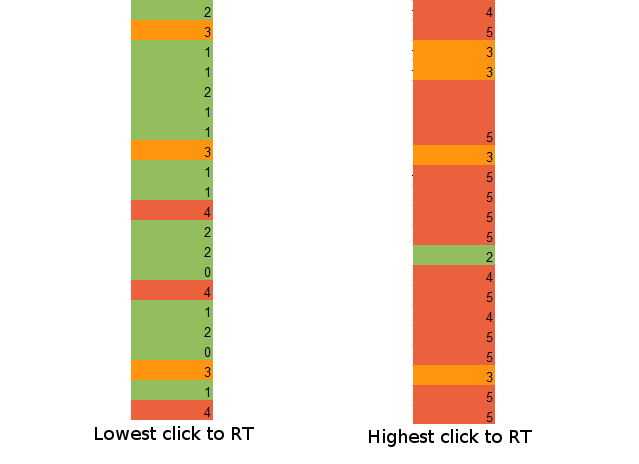If you hate graphs and stats and nerdy things, please look away now. If you run a sex blog, or you’re just curious as to how one works, step a little closer.
I’ve always had a theory, based on what I tend to see on Twitter and Facebook, that despite billing this as a sex blog, the most popular posts are actually the ones that are fairly tangential to sex acts themselves. Posts about feminism, dating, the Friend Zone – anything that falls roughly into the category of ‘ranty ones.’ These posts tend to get more retweets, shares, comments, and all the things that a wanky social media manager would irritatingly call ‘engagement.’ But when it comes to traffic, the filthy blog posts get far more, by quite some margin.
When I’ve chatted to other bloggers about this on Twitter, some of them have been as curious as I am. If you’re a sex blogger, is it worth sprinkling some politics in with your filth? If you’re a different kind of blogger, is it worth expanding your reach with some well-targeted sex chat?
And, the thing I’m most intrigued about: despite occasionally being annoyed when I link to filth, are people on Twitter actually more likely to click a link if they think it’s #nsfw?
Let’s have a look.
Most popular posts
Here are the five most popular posts published between October-December 2014 (I’ve gone with this older period because posts which were published last week won’t have had much search traffic yet, so it wouldn’t be a fair test).
- Cuckolding (filth rating: 5/5)
- Porn censorship (filth rating: 2/5)
- What does an orgasm look like? (filth rating: 3/5)
- Where are all the pervy women? (filth rating: 1/5)
- Adventures in deep throat (Guest blog) (filth rating: 5/5)
This graph shows pageviews for that 3 month period, alongside the pageviews of an average post published during that period.
A pretty decent mix of filth and ranting, although probably not representative: the most popular post got around 9,000-ish pageviews, of which 1,600 came from search and around 5,000 from referral. The third post (orgasms) was as a result of a competition, and got way more referrals than an average post would too. That’s pretty unusual. Referrals can skew the numbers, because just one link from a popular website can throw everything else out of whack.
The vast majority of ‘top’ posts each month aren’t ones which Reddit has found, they’re ones which hang around quietly getting traffic from Google, which kind of makes sense based on my own… err… habits. Google visits have a tendency towards filth, as you can see from this – the top posts across the whole site for that same 3 month period, based purely on search traffic.
- What does an orgasm feel like? (filth rating: 3/5)
- How to say goodnight (filth rating (5/5)
- Butt plugs (filth rating: 5/5)
- First time pegging (filth rating: 5/5)
- Throatfucking (filth rating: 5/5 obvs)
‘What does an orgasm feel like’ has a slightly higher filth rating (3/5) than the ‘What does an orgasm look like’ post mentioned above (it contains more text that I’d count as pretty porny), but apart from that each of these posts comes in at a stone-cold 5/5. Search loves filth. Who’d have thought?
But the original question, and the theory I really wanted to test, was whether Twitter people are more likely to have a cheeky click on a filth tweet than on one which is vaguely safe for work. So let’s look at Twitter referrals.
Most popular posts from Twitter
Here are the most popular posts when looking at Twitter referral traffic, via Google analytics. This means no one who comes from search engines, direct, or via other sites or networks. Just the people who visit from Twitter.
- Censorship (filth rating: 2/5) – this one featured on the top for that period overall
- What does an orgasm look like? (filth rating: 3/5) – likewise
- Sex and anxiety and panic (filth rating: 3/5)
- Good2Go consent app is shit (filth rating: 0/5)
- Cuckolding (filth rating: 5/5) – this one featured on the top for that period overall
As you can see, when you look purely at Twitter referral, two blogs sneak in. Sex and anxiety is a bit dirty but also partly emotional, so I’ve scored it fairly low, and the consent app one is pure rant and no shagging. Is this a good way to measure that stuff though? No: it’s shit. Looking purely at Google Analytics, you can’t easily see how often a blog was tweeted. If Censorship got promoted more (which it did), and other blogs didn’t get promoted at all (ditto: sometimes I forget), then Google Analytics won’t give a clear picture.
Let’s move over to Twitter’s analytics, and compare RTs and clicks directly.
[If you want to do this yourself, just hover over your avatar in Twitter, and go down the menu to ‘analytics’ – you can get an absolute shitload of data about your tweets, and you can export it all into a lovely shiny spreadsheet]
Most retweeted posts
A dilemma here: posts which get the most retweets will naturally get more clicks (because they’ll have been seen by more people – duh). So I took the top 100 tweets which contained a url, and worked out their ‘click-to-retweet’ ratio. You’re right – I should get out more.
Anyway. A high click-to-RT ratio indicates that people are likely to be interested in a particular tweet, but less likely to want to publicly reproduce it on their timeline. On the left are the least-clicked tweets (with an average click-to-retweet ratio of 8:1). On the right are the most-clicked tweets (with an average click-to-retweet ratio of 71:1).
I gave each tweet a score from 0-5, depending on how filth it was, then colour-coded the cells so you can see at a glance. The redder a cell is, the filthier the post. I think you can probably see what I’m getting at.
If you’re nerdy, you’ll be smashing your head into the keyboard in frustration that I haven’t adjusted this data to include the baseline stats for a tweet which gets NO RTs. Don’t worry, I have. A tweet which gets no RTs gets an average of 93 url clicks, so here are the two columns adjusted to take account of that.
Again, on the left are the low click-to-RT tweets, and on the right the high ones.
So, what makes a popular sex blog post?
The answer depends on how you define ‘popular.’ If you count retweets, then you’ll want to avoid writing erotica about your latest threesome, and consider instead how you can put a political, philosophical, or downright ranty spin on it. If you only care about clicks or pageviews, then no matter which way you cut it, the filth will win hands down.
However, I’m not going to tell you to stop writing other kinds of posts, because if you genuinely want to build a decent blog audience, you need to do more than just tittilate for clicks. While my most popular posts will probably always include words like ‘throatfuck’, and bring hopeful wankers in from Google, there’s a huge value in posts which do something different.
I live in a fairly niche filter-bubble, and I reckon my writing reflects that: part angry lefty, part horny girl wanking at the back of the bus. And yet I’ve seen any number of bloggers worrying that if they branch out too much from that niche, they’ll turn off a bunch of people who are following for one particular reason. So if you’re wondering why I’ve bothered writing this blog, it’s partly as an encouragement: something outside your sex blog niche may not get as many clicks, but it’ll probably get retweeted more, putting you in front of a new audience – curious people who wouldn’t normally follow a sex blogger.
It’s partly also because I fucking love spreadsheets. And analysing things that no one else has thought to study yet. If I’m honest, it’s also because – as I discovered when wading through all this – things with graphs tend to get retweets too.





10 Comments
A SEO expert told me once absolutely nothing makes more difference than just having quality content. All the tricks in the book won’t add up to the effect that having regular top quality content will.
If your blog proves anything it’s probably that.
You’re right, but I think sometimes people find it handy to have specific things they can think about – quality on it’s own can be quite a broad thing to chase. What I’m basically trying to say here, I think is ‘don’t be nervous to branch out’, especially in light of lots of blogging advice that tells people to find a niche- temptation can often be to stick to one topic.
And ta for the compliment =)
FYI: the correct suffix for nerdage is nerdagery ;)
We have a fairly steady readership and, although we have some free ebooks, we find that we sell quite a few books to people who have enjoyed our erotica.
We made a deliberate effort to only describe the truth about our sex. We are now both in our sixties so we have a long lifetime to recount. Unfortunately for us, but fortunately for our readers, we were forced apart by my parents and both had our own sexual adventures for some forty-five years which included a happy, but tragic marriage for him and a violent and unhappy marriage for me ending in a violent rape by my abusive husband. We have both been able to write about these events unselfconsciously because a friend helped us set up our blog and story site in anonmous names.
Over those 45 years I had over twenty partners including an assexual man, an attempted rape, the violent rape aforementioned by my husband and a beautiful bisexual affair which was absolutely wonderful, but didn’t lead anywhere.
Peter, on the other hand, was devastated by us being broken up in our teens and plunged himself into a decade of experimental sex, debauchery and orgies until he met his first wife and started a family. He is not completely certain, but believes he has had over one hundred sexual partners, many of which during orgies in the late sixties and early seventies (the summers of love) when he had sex with as many as six girls in single evenings. All consentual I might add.
We found each other in the most lovely way in 2010 and have been happy together as very sexual wrinklies ever since. We make love six to eight times per month and thoroughly enjoy our retirement lovemaking.
We have built our stories into a cohesive website and delight in retelling our stories on-line completely free of charge.
We understand that annonimity is too difficult for the average person to achieve so not everyone can write as freely as us, but on our true-storytime site we are always willing to consider submitted stories as long as they are true and, of course, it is pretty obvious when people are writing fantasy – they are too fantastic. LOL.
Anyway, there’s our take on sex blogging. We think Girl On The Net is one of the best sites available and make a point of linking to it whenever the opportunity arises.
Angie & Peter
Hi Angie + Peter – wow, that’s an amazing story. I love that you found each other after being apart for so long, and sorry to hear that you had some awful experiences in the meantime. I agree with you that anonymity can be really difficult, and I think those of us who can manage it are lucky (whatever our reasons for staying anonymous – I’d love to not *have* to try and be anonymous, but there are lots of reasons why that wouldn’t work for me at the moment). I LOVE the sex blogging community and how it lets us share these stories openly – I think more discussion on sex is a really healthy thing, and delighted that you’re joining in. Thank you also for linking to my blog, and being lovely about it xx
one thing i want to tell you. why do people pay more at big branded sellers while same item is available at cheaper price at small sellers. people need to spend more time to seach small sellers
Because sometimes (not always) smaller sellers are seen as less reputable, and more likely to spam blog comments with laughably transparent attempts to garner clicks.
I’ve stripped the link from your comment.
I also love the use of graphs and spreadsheets, especially since my academic background is in research and statistical analysis. Having a website, I’ve used a lot of quantitative data to improve visibility and rankings. Google Keyword Planner and SEO analytic software is almost as fun as producing the actual content for a website…at least for me. If you want to continue to get traffic to your website, I think it’s imperative to keep up with how these things work. You can have the best content in the world, but if Google is censoring it or penalizing it for old and defunct SEO tactics, the traffic can drop overnight. I love reading this site, so I hope the search engines like it as much as I do.
Just the post for me!
My wife is not so interested in the technical side of our blog and SEO, as much as I am.
We are not as close popular as your blog is, nor we exist that long so gathering data from our posts is still not possible in that amount. But! As I’m also a spreadsheet junkie, I did try and see the correlation of the topic, headline and ”clicks”.
Conclusion #1
An article that provides some kind of value for the reader (some helpful advice, how-to articles and similar) will probably have more retweets and comments.
Conclusion #2
An article with an ”unusal”/ dirty/ naughty topic will have more clicks – more visitors on the page. The number is even higher if we include a couple of photos.
This is more or less the same thing as you stated.
Could be that content that gives value has more chances on ranking on Google.
What is your opinion on that?
Anyway, great article.
Ahah this list looks amazing. Sex blogs are the best on the internet, you can find so many kinky stuff there! Thanks for sharing.